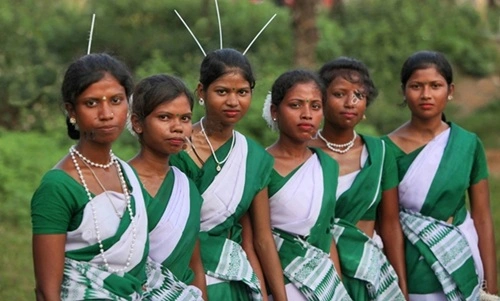When considering the traditional dress of Jharkhand, both for men and women, you’ll often see that touch of their tribal culture and the connection with nature, and that’s the stunning part about it all. So, if you’re feeling a bit or extra excited about what people wear traditionally in Jharkhand, then just keep on reading because that’s what we’re all about today.
Traditional Dress of Jharkhand for Women

If you check out the traditional dress of women in Jharkhand, you’ll notice one thing that most of these dresses actually reflect the tribal roots, heritage, and the connection to nature itself.
1. The Panchi and Parhan
This is the most preferred and famous dress option for women in Jharkhand because it is not just comfortable to wear but super practical as well. And at times, when it is some big occasion or festival, this traditional dress can be super fancy with luxurious fabric and of course, some mirrors and embroidery work.
- Panchi: It is a long cloth wrapped around the waist like a skirt, but it looks unique because of the different style.
- Parhan: This is just a simple blouse worn on top.
When worn together, of course, they create a somewhat modest and super comfortable dress for women, which they can wear casually every single day. And often, or most of the time, this dress is complete with a drape over the shoulder similar to a saree’s pallu.
2. Sarees and Tribal Silks
It is true that sarees are a major choice of attire in Jharkhand as well, mostly during festival times. Surely, you won’t see women wearing sarees for regular, casual, and everyday attire. But still, the area is well-known for the Tussar, Kuchai, and Swarnarekha silk sarees.
- Tussar Silk: This is among the famous ones and is known for its soft texture and natural shine.
- Kuchai Silk: This one is specifically unique to Jharkhand, sourced from forest-grown cocoons.
3. Traditional Jewelry
Jewelry is the perfect match for the cultural dress, no doubts about that. Women put on ornaments that are made of silver, brass, copper, and sometimes even wood or beads.
Some well-known pieces include:
- Hasuli: A neckpiece
- Tarpat: Cone-shaped earrings
- Kardhani: A waist belt
4. Modern Touches
Women of the new generation are not hesitating to combine traditional garments with their fashionable taste, and that’s happening as we speak. It is not uncommon to witness the sarees worn with chic blouses or kurtas being fabricated of tribal fabrics. Such a combination serves to retain the heritage of the past while making it compatible with the current trends.
Traditional Dress of Jharkhand for Men
Jharkhand’s men have kept their traditional dress very much aligned with their lifestyle, like it is basic, comfy, and has a strong connection with the everyday life of the tribes. In short, super practical yet comfortable!
1. The Bhagwan
One of the highly popular traditional costumes for men that is specifically typical for the Santhal and Paharia tribes is the Bhagwan, which is also their signature dress.
This is basically one piece of a vibrant, colored fabric that is put on the body. Made of cotton and quite comfortable, it is widely recognized as an appropriate outfit for use during the hot season and also for use during the performance of ritual, folk dance, or cultural events.
2. The Dhoti-Kurta
The dhoti-kurta dress is one more timeless apparel, which tribal as well as non-tribal males have been wearing it.
- Dhoti: a long rectangular cloth tied around the waist.
- Kurta: a loose, comfortable shirt worn on top.
Cotton ones are used every day, whereas silk kurtas are chosen for the celebration. Oh, and sometimes with vibrant colors, prints, and embroidery.
3. The Gamchha
The Gamchha is a must-have accessory. A cotton towel is either put around the neck or the shoulders, it is a very handy thing for daily work and also shows the pride of the local handcrafted products.
4. Headgear and Turbans
Pagri or Safa are types of headgear that generally come with the wear of a turban on festive or ceremonial occasions. A turban is often a symbol of love, pride, and honor, not only by the wearer but also in the circle of the local community.